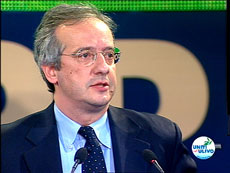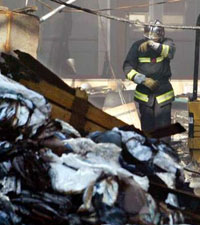|
Poverty, Racism Blamed for French Riots
 |
|
Sarkozy's
"rabble" remark reflected, according to some, a sort of
institutionalized racism in France. (Reuters)
|
PARIS,
November 7, 2005 (IslamOnline.net & News Agencies) – With French
riots witnessing the first fatality Monday, November 7, people and
European officials started putting down theories on the possible root
causes of the violent nightly unrest that entered its twelfth night
and showed no signs of abating.
European
officials voiced concern, with some of them giving
"diplomatic" explanations as to why, as a battle over the
blame broke out on the Internet, with people trying to fathom the
causes of the escalating violence, according to Agence France-Presse
(AFP).
Many
of the North Africans in France were second and third generation
Frenchmen, a writer identifying himself as Jeff from Boston in the
United States said on a BBC discussion forum.
"France
is their only home, yet they face neglect, discrimination, and racism.
The French government has concerned itself with relatively superficial
issues such as the veil (hijab) when the biggest problems such as
decent housing and unemployment have been ignored. The rioters in
France are not violent Muslims, but disenfranchised citizens," he
said.
Europe
needed immigrants for cheap labor, said another contributor to the BBC
forum, Housam of Swindon, who was offended by French interior minister
Nicolas Sarkozy's description of the rioters as "rabble."
"The
indigenous Europeans always want it all: they want the immigrants to
do the menial jobs they hate but they are not ready to deal with them
on equal grounds as human beings. Indigenous Europeans still live with
the colonial mentality of superiority. When the French revolution
started against inequality, rioters were also accused of being
"scum".
Lack
of Integration
 |
|
The
problem facing Paris is one of integration, reception and the
ability to respond," said Veltroni.
|
On
the official level, Rome's Mayor Walter Veltroni blamed the ongoing
riots in the Paris suburbs on a "problem of integration" and
urged policies aimed at preventing exclusion.
"Rome
and Paris are in different situations: the French capital has a
problem of integration. The problem facing Paris is one of
integration, reception and the ability to respond," said the
mayor, a member of Italy's main opposition Democrats of the Left
party, according to AFP.
"Local
Italian governments overall, whether on the right or the left, have
done a lot of work for social cohesion in the suburbs. We do it on a
daily basis," he said.
Veltroni
recommended "putting in place integration policies that respect
people's identity and at the same time help prevent exclusion and
rejection."
Other
officials voiced concern.
"Everybody
is concerned at what is happening, and I send every support to the
French government and to the French people in dealing with the
situation," British Prime Minister Tony Blair said at a monthly
press conference.
Politicians
and observers said the violence in France, which saw 1,400 cars set on
fire overnight Sunday in the worst night of rioting so far, was due to
a unique set of factors there and unlikely to spread.
"We
should never be complacent about these things, although I think our
situation, in some ways, is different," Blair said.
"I
suspect it is part of the French authorities gripping (coming to grips
with) a law-and-order situation, which has to be done."
Copycat
Attacks
 |
|
The
riots showed no sign of abating for the 11th day running.
(Reuters)
|
On
the other hand, France's European neighbors kept a wary eye for any
sign the violence may cross borders.
With
police across Europe saying they would remain vigilant against copycat
attacks, a handful of cars were torched in Berlin and incidents were
reported also in Brussels.
Five
cars were torched in a working-class area of the German capital Berlin
overnight, which police said may have been an attempt to copy the
violence in France, according to AFP.
There
was also a second straight night of incidents in the northern German
port city of Bremen where seven metal containers were set alight 24
hours after several cars and a disused building were burned.
Germany's
incoming interior minister, the veteran conservative Wolfgang
Schaeuble, said however he did not believe his country would suffer
the sort of rioting which has caused widespread damage on the
outskirts of Paris and in other French cities.
"We
do not have these enormous high-rise developments that you see on the
edge of French cities," he told Monday's Bild newspaper.
"But
in Germany too there are areas with a high percentage of foreigners
who increasingly feel separated from the rest of society."
But
Italy's opposition leader Romano Prodi has said that an explosion of
urban violence in Italy is "only a matter of time".
"We
have the worst suburbs in Europe," the former EU Commission
president said in a debate in the northern city of Bologna, AFP
reported.
"We
must not think we are so different to Paris. Our suburbs are a human
tragedy, and if we don't take serious action on social and housing
issues we will have many scenes like Paris."
Prodi,
who leads the Union, a coalition of disparate left-wing parties
including the Democrats of the Left, is expected to mount a stiff
challenge to incumbent Prime Minister Silvio Berlusconi in a general
election next April.
There
were also incidents in Belgium, where five cars were set alight in
central Brussels overnight Sunday, but officials downplayed any link
with the violence in France.
The
vehicles were destroyed near the Gare du Midi, a district with a large
immigrant population just south of the Belgian capital's historic
heart.
A
spokesman for the government's crisis center said it was monitoring
the violence in France but there had so far been "no similar
events" in Belgium.
The
riots in France saw Monday the fall of the first human fatality.
Jean-Jacques Le Chenadec, 61, died in hospital after being knocked
into a coma by a hooded young man last week, as he was discussing the
riots with a neighbor in the northern Paris suburb of Stains,
according to AFP.
On
October 27, the electrocution of two teenagers, believed to be traced
by the police in the slump Seine-Saint-Denis, sparkled the trouble,
the worst since students' riots in 1968.
|